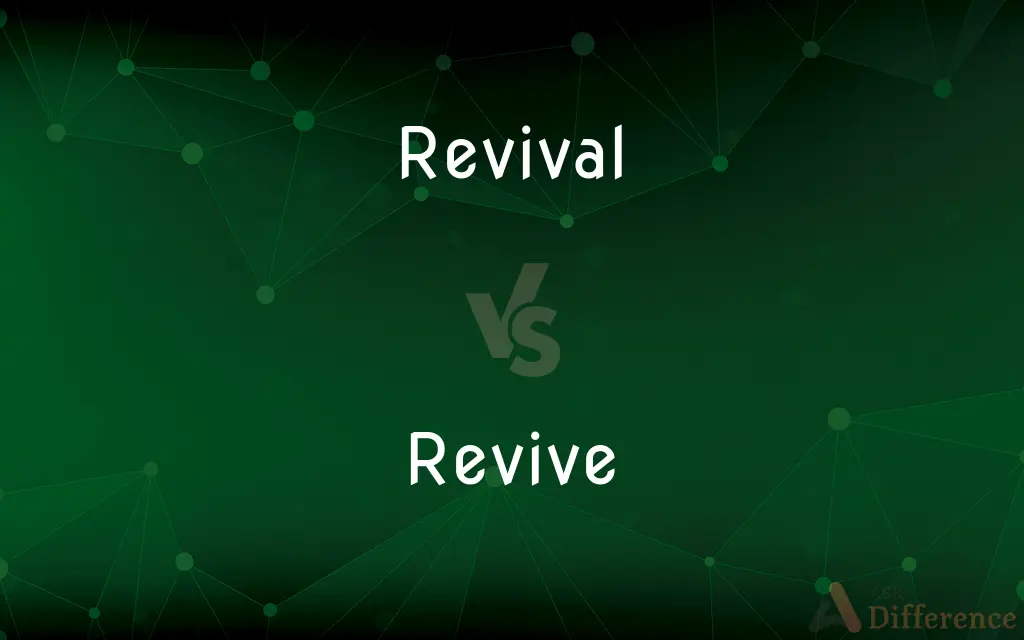Revival vs. Revive — What's the Difference?
Edited by Tayyaba Rehman — By Fiza Rafique — Updated on March 28, 2024
"Revival" refers to the process or event of something being brought back to life or prominence, while "revive" is the action of restoring life, consciousness, or strength to someone or something.

Difference Between Revival and Revive
Table of Contents
ADVERTISEMENT
Key Differences
"Revival" is a noun that denotes the act or process of bringing something back into use, attention, or being after a period of obscurity or decline. It often pertains to cultural, spiritual, or social phenomena, such as a revival of interest in traditional crafts, a religious revival, or the revival of a previously popular music genre. On the other hand, "revive" is a verb that describes the action of regaining life, consciousness, strength, or validity. This term is broadly applied, from medical contexts (reviving someone from unconsciousness) to ecological (reviving an endangered species or ecosystem) and technological (reviving an obsolete technology).
In cultural contexts, a revival might refer to a renewed interest in art, literature, or theater that has fallen out of popular favor. This could be the revival of Shakespearean plays in modern settings, indicating a broader societal or cultural interest. Conversely, to revive Shakespearean plays in a community theater could involve specific actions like selecting the plays, casting actors, and staging performances, thereby applying the verb form to describe these activities.
In religious terms, a "revival" often indicates a widespread reawakening of faith or religious fervor within a community or region, typically characterized by meetings, conversion experiences, and renewed zeal among believers. To "revive" one's faith, however, would be a more personal experience, involving individual actions such as prayer, meditation, or participation in religious services to strengthen one's spiritual beliefs.
The distinction between the two terms also highlights their usage in sentences: "revival" as a noun fits into contexts describing events, periods, or processes, while "revive" as a verb suits actions undertaken by individuals or groups to instigate this renewal. Despite their differences, both terms underscore the concept of bringing back to life or consciousness, whether it's applied to ideas, movements, faith, or physical health.
Comparison Chart
Part of Speech
Noun
Verb
ADVERTISEMENT
Definition
The process or event of bringing something back to life or prominence.
The action of restoring life, consciousness, or strength.
Usage
Describes events, movements, or periods of renewal.
Describes the act of causing renewal or restoration.
Examples
A revival of folk music in the 21st century.
Efforts to revive endangered languages.
Contexts
Cultural, religious, social phenomena.
Medical, ecological, technological applications.
Compare with Definitions
Revival
Bringing back obsolete technologies or ideas in a new form.
The revival of classic video game consoles has introduced them to a new generation.
Revive
Efforts to restore ecosystems or species.
Conservationists aim to revive the population of the endangered tiger.
Revival
An evangelistic meeting intended to reawaken interest in religion
Revive
Renewing personal interest or faith.
She sought to revive her interest in painting after years of neglect.
Revival
A period of renewed spiritual enthusiasm within a community.
The town experienced a religious revival, drawing large crowds to revival meetings.
Revive
Stimulating growth or interest in a sector.
The campaign aims to revive the local bookstores struggling against online retailers.
Revival
An event or process of bringing something back into use or attention.
The revival of vinyl records reflects a growing appreciation for analog sound quality.
Revive
To restore to life or consciousness.
Paramedics worked to revive the unconscious man.
Revival
The act or an instance of reviving
The revival of a person who fainted.
Revive
To bring back to life or consciousness; resuscitate
Revived the passenger who fainted.
Revival
Renewed interest in cultural or artistic expressions.
The revival of traditional dance forms has invigorated the local arts scene.
Revive
To give new health, strength, or spirit to
Was revived by the long shower.
A speech that revived morale.
Revival
The condition of being revived.
Revive
To restore to use, currency, activity, or notice
Revived a fad from the 1980s.
Revival
A restoration to use, acceptance, activity, or vigor after a period of obscurity or quiescence
A revival of colonial architecture.
A revival of the economy.
Revive
To present (an old play, for example) again.
Revival
A new presentation of an old play, movie, opera, ballet, or similar production.
Revive
To renew in the mind; recall
An experience that revived a bad memory.
Revival
A time of reawakened interest in religion.
Revive
To return to life or consciousness
The patient revived after the anesthetic wore off.
Revival
A meeting or series of meetings for the purpose of reawakening religious faith, often characterized by impassioned preaching and public testimony.
Revive
To regain health, vigor, or good spirits
We only revived after the heat wave broke.
Revival
Restoration to validity of something lapsed or set aside, such as a legal claim or status.
Revive
To return to use, currency, activity, or notice
His interest in sculpture revived late in life.
Revival
The act of reviving, or the state of being revived.
Revive
(intransitive) To return to life; to become reanimated or reinvigorated.
Revival
Reanimation from a state of languor or depression; applied to health, a person's spirits, etc.
Revive
(transitive) To return to life; to cause to recover life or strength; to cause to live anew, or to prevent from dying.
The dying puppy was revived by a soft hand.
Her grandmother refused to be revived if she lost consciousness.
Revival
Renewed interest, performance, cultivation, or flourishing state of something, as of culture, commerce, agriculture.
Post-punk revival
Revive
(ambitransitive) To recover from a state of oblivion, obscurity, neglect, or depression.
Classical learning revived in the fifteenth century.
The Manx language has been revived after dying out and is now taught in some schools on the Isle of Man.
Revival
Renewed prevalence of something, as a practice or a fashion.
The revival of hot pants
Revive
To restore, or bring again to life; to reanimate; to make lively again.
This new paint job should revive the surgery waiting room.
Revival
(religion) Renewed interest in religion, after indifference and decline; a period of religious awakening; special religious interest.
Revive
(transitive) To raise from coma, languor, depression, or discouragement; to bring into action after a suspension.
Revival
(Christianity) A Christian religious meeting held to inspire active members of a church body or to gain new converts.
Revive
(transitive) To renew in the mind or memory; to bring to recollection; to recall attention to; to reawaken.
The Harry Potter films revived the world's interest in wizardry
Revival
(law) Restoration of force, validity, or effect; renewal; reinstatement of a legal action.
The revival of a debt barred by limitation
The revival of a revoked will
Revive
(intransitive) To recover its natural or metallic state (e.g. a metal)
Revival
(chemistry) Revivification, as of a metal.
Revive
(transitive) To restore or reduce to its natural or metallic state
To revive a metal after calcination
Revival
The act of reviving, or the state of being revived.
Revive
To return to life; to recover life or strength; to live anew; to become reanimated or reinvigorated.
The Lord heard the voice of Elijah; and the soul of the child came into again, and he revived.
Revival
Bringing again into activity and prominence;
The revival of trade
A revival of a neglected play by Moliere
The Gothic revival in architecture
Revive
Hence, to recover from a state of oblivion, obscurity, neglect, or depression; as, classical learning revived in the fifteenth century.
Revive
To recover its natural or metallic state, as a metal.
Revive
To restore, or bring again to life; to reanimate.
Those bodies, by reason of whose mortality we died, shall be revived.
Revive
To raise from coma, languor, depression, or discouragement; to bring into action after a suspension.
Those gracious words revive my drooping thoughts.
Your coming, friends, revives me.
Revive
Hence, to recover from a state of neglect or disuse; as, to revive letters or learning.
Revive
To renew in the mind or memory; to bring to recollection; to recall attention to; to reawaken.
The mind has a power in many cases to revive perceptions which it has once had.
Revive
To restore or reduce to its natural or metallic state; as, to revive a metal after calcination.
Revive
Cause to regain consciousness;
The doctors revived the comatose man
Revive
Give new life or energy to;
A hot soup will revive me
This will renovate my spirits
This treatment repaired my health
Revive
Be brought back to life, consciousness, or strength;
Interest in ESP revived
Revive
Restore from a depressed, inactive, or unused state;
He revived this style of opera
He resurrected the tango in this remote part of Argentina
Revive
Return to consciousness;
The patient came to quickly
She revived after the doctor gave her an injection
Common Curiosities
Is a revival always religious?
No, a revival can pertain to any aspect of culture, society, or personal interest, though it is often used in religious contexts to describe a reawakening of faith.
How can one revive a forgotten tradition?
Reviving a forgotten tradition involves taking specific actions to restore interest or practice, such as organizing events, educating others, or incorporating it into community activities.
What role does individual action play in a revival?
Individual actions are crucial in initiating and sustaining a revival, whether it’s through advocacy, participation, or leadership in promoting the renewed interest or activity.
Can technology be revived?
Yes, technology can be revived, either by reintroducing obsolete technologies in new forms or by updating and reusing older concepts for modern applications.
How does one measure the success of a revival?
The success of a revival can be measured by the increased visibility, participation, or sustainability of the revived interest, practice, or belief within a community or field.
What does it mean to experience a revival?
Experiencing a revival means being part of a process or event where something is brought back to life, prominence, or popularity after a period of decline.
What is the difference between reviving and restoring?
Reviving implies bringing back to life or consciousness, focusing on renewal and revival, while restoring often refers to bringing something back to its original state or condition, emphasizing repair or reconstruction.
How do revivals impact society?
Revivals can have a significant impact on society by renewing interest in cultural heritage, strengthening community bonds, invigorating religious faith, or sparking innovation in technology and arts.
Can a language be revived?
Yes, endangered or extinct languages can be revived through dedicated efforts in education, documentation, and community engagement, encouraging new generations to learn and speak the language.
What motivates a revival in arts or music?
A revival in arts or music is often motivated by a desire to reconnect with cultural roots, explore historical significance, or rediscover the aesthetic and emotional appeal of past styles.
Share Your Discovery

Previous Comparison
Lastly vs. Finally
Next Comparison
Leaver vs. LeverAuthor Spotlight
Written by
Fiza RafiqueFiza Rafique is a skilled content writer at AskDifference.com, where she meticulously refines and enhances written pieces. Drawing from her vast editorial expertise, Fiza ensures clarity, accuracy, and precision in every article. Passionate about language, she continually seeks to elevate the quality of content for readers worldwide.
Edited by
Tayyaba RehmanTayyaba Rehman is a distinguished writer, currently serving as a primary contributor to askdifference.com. As a researcher in semantics and etymology, Tayyaba's passion for the complexity of languages and their distinctions has found a perfect home on the platform. Tayyaba delves into the intricacies of language, distinguishing between commonly confused words and phrases, thereby providing clarity for readers worldwide.
















































